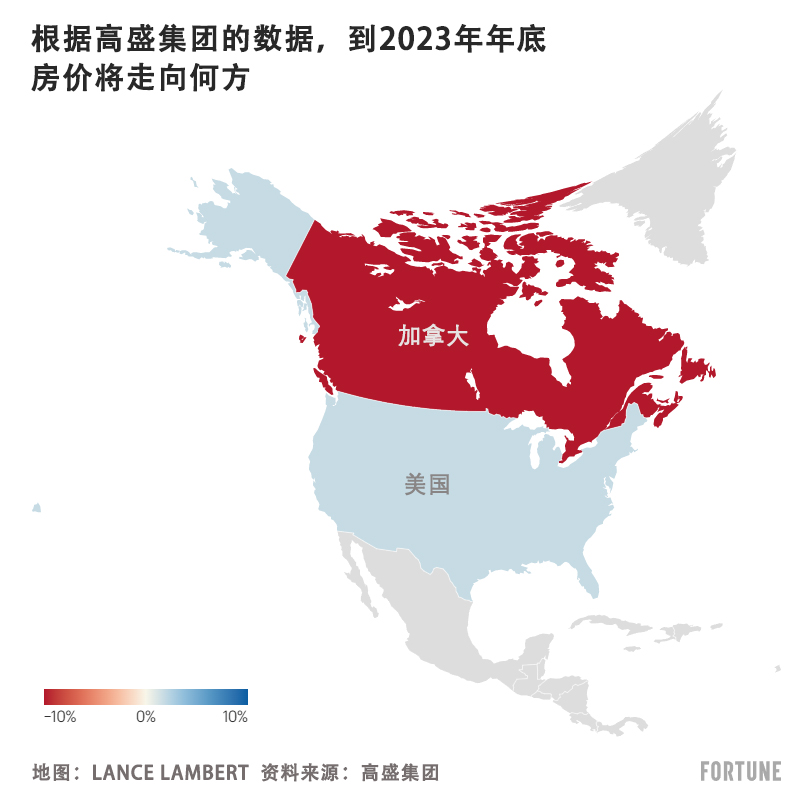
十多年來,,發(fā)達國家的住宅房地產(chǎn)似乎首次受到價格下跌的影響,。在房價出現(xiàn)前所未有的上漲后,當各國央行轉(zhuǎn)而進入加息模式時,,就會發(fā)生這種情況,。
但與2008年房地產(chǎn)泡沫破裂不同的是,美國不會成為這次房地產(chǎn)回調(diào)的中心,。至少高盛集團(Goldman Sachs)是這么認為的,。
今年9月,高盛集團的研究人員發(fā)布了《房地產(chǎn)市場低迷:新西蘭,、澳大利亞和加拿大房地產(chǎn)市場問題更嚴重》(The housing downturn: A bigger deal down under and up north)的論文,。該論文預(yù)測,到2023年年底,,新西蘭(-21%),、澳大利亞(-18%)和加拿大(-13%)的房價將出現(xiàn)崩盤式下跌。相比之下,,在美國房地產(chǎn)泡沫期間,,房價從2006年的峰值到2012年的谷底下跌了27%,。
高盛集團顯然把澳大利亞、加拿大和新西蘭歸入了房地產(chǎn)崩盤(或幾乎崩盤)陣營,,但它對其他十國集團(G10)國家的房地產(chǎn)市場并不那么悲觀,。高盛集團的研究人員預(yù)測,到2023年年底,,法國的房價將下跌6%,,而英國的房價將保持不變。與此同時,,他們表示,美國房價實際上將在2023年上漲1.8%,。

為什么高盛集團對澳大利亞和新西蘭等國房地產(chǎn)的悲觀程度遠超美國,?這歸結(jié)為獨立的基本面。雖然美國房價歷史上一直存在泡沫,,但加拿大等國的房價卻高得離譜,。僅在2021年,加拿大的房價就飆升了27%,,而美國的房價則上漲了18.9%,。
高盛集團的研究人員寫道:“在整個十國集團中,房屋銷售正在迅速下降,,房價增長正在放緩,,在新冠疫情期間漲幅較大的國家,房價直線下跌,?!?/p>
盡管如此,研究人員指出,,美國一些地區(qū)的房地產(chǎn)市場未來很可能會出現(xiàn)房價下跌,。是哪些地區(qū)的房地產(chǎn)市場呢?高盛集團沒有透露,。然而,,這份名單可能包括博伊西和菲尼克斯這樣存在房地產(chǎn)泡沫的城市。
穆迪分析公司(Moody 's Analytics)的另一項分析預(yù)測,,美國房價要么將保持穩(wěn)定,,要么將從峰值跌至谷底,跌幅最高可達5%,。在包括博伊西和夏洛特在內(nèi)的美國187個被嚴重“高估”的地區(qū)房地產(chǎn)市場中,,穆迪分析公司預(yù)測房價將下跌5%至10%。但這一情況出現(xiàn)的前提是美國經(jīng)濟不會陷入衰退,。穆迪分析公司認為,,如果美國經(jīng)濟陷入衰退,,美國的房價就將下跌5%至10%,被嚴重高估的地區(qū)房價將下跌15%至20%,。

不過,,雖然高盛集團和穆迪分析公司等機構(gòu)沒有預(yù)測美國房地產(chǎn)市場會崩盤,但這并不意味著房地產(chǎn)市場低迷不會削弱美國整體經(jīng)濟,。事實上,,由房地產(chǎn)市場低迷引發(fā)的經(jīng)濟萎縮已經(jīng)出現(xiàn)。
上周,,高盛集團的研究人員預(yù)測,,美國房地產(chǎn)市場活動將在2022年和2023年出現(xiàn)全面下滑。該公司預(yù)計,,今年美國新屋銷售(下降22%),、現(xiàn)房銷售(下降17%)和住房GDP(下降8.9%)將大幅下降。高盛集團預(yù)計,,明年美國新屋銷售(再下降8%),、現(xiàn)房銷售(再下降14%)和住房GDP(再下降9.2%)將進一步下降。
在新西蘭,、澳大利亞和加拿大等國家,,持續(xù)的房市修正造成的經(jīng)濟萎縮可能會更加嚴重。
高盛集團的研究人員寫道:“基于對房價的負面展望以及住宅投資和住房財富的重要性,,我們發(fā)現(xiàn),,房地產(chǎn)市場低迷對新西蘭、澳大利亞和加拿大的國內(nèi)生產(chǎn)總值構(gòu)成了更大的下行風(fēng)險,?!痹撏顿Y銀行表示,在新西蘭,,房地產(chǎn)市場低迷很可能會讓該國的整體經(jīng)濟陷入衰退,。(財富中文網(wǎng))
譯者:中慧言-王芳
十多年來,發(fā)達國家的住宅房地產(chǎn)似乎首次受到價格下跌的影響,。在房價出現(xiàn)前所未有的上漲后,,當各國央行轉(zhuǎn)而進入加息模式時,就會發(fā)生這種情況,。
但與2008年房地產(chǎn)泡沫破裂不同的是,,美國不會成為這次房地產(chǎn)回調(diào)的中心。至少高盛集團(Goldman Sachs)是這么認為的,。
今年9月,,高盛集團的研究人員發(fā)布了《房地產(chǎn)市場低迷:新西蘭、澳大利亞和加拿大房地產(chǎn)市場問題更嚴重》(The housing downturn: A bigger deal down under and up north)的論文。該論文預(yù)測,,到2023年年底,,新西蘭(-21%)、澳大利亞(-18%)和加拿大(-13%)的房價將出現(xiàn)崩盤式下跌,。相比之下,,在美國房地產(chǎn)泡沫期間,房價從2006年的峰值到2012年的谷底下跌了27%,。
高盛集團顯然把澳大利亞,、加拿大和新西蘭歸入了房地產(chǎn)崩盤(或幾乎崩盤)陣營,但它對其他十國集團(G10)國家的房地產(chǎn)市場并不那么悲觀,。高盛集團的研究人員預(yù)測,,到2023年年底,法國的房價將下跌6%,,而英國的房價將保持不變,。與此同時,他們表示,,美國房價實際上將在2023年上漲1.8%。
為什么高盛集團對澳大利亞和新西蘭等國房地產(chǎn)的悲觀程度遠超美國,?這歸結(jié)為獨立的基本面,。雖然美國房價歷史上一直存在泡沫,但加拿大等國的房價卻高得離譜,。僅在2021年,,加拿大的房價就飆升了27%,而美國的房價則上漲了18.9%,。
高盛集團的研究人員寫道:“在整個十國集團中,,房屋銷售正在迅速下降,房價增長正在放緩,,在新冠疫情期間漲幅較大的國家,,房價直線下跌?!?/p>
盡管如此,,研究人員指出,美國一些地區(qū)的房地產(chǎn)市場未來很可能會出現(xiàn)房價下跌,。是哪些地區(qū)的房地產(chǎn)市場呢,?高盛集團沒有透露。然而,,這份名單可能包括博伊西和菲尼克斯這樣存在房地產(chǎn)泡沫的城市,。
穆迪分析公司(Moody 's Analytics)的另一項分析預(yù)測,美國房價要么將保持穩(wěn)定,要么將從峰值跌至谷底,,跌幅最高可達5%,。在包括博伊西和夏洛特在內(nèi)的美國187個被嚴重“高估”的地區(qū)房地產(chǎn)市場中,穆迪分析公司預(yù)測房價將下跌5%至10%,。但這一情況出現(xiàn)的前提是美國經(jīng)濟不會陷入衰退,。穆迪分析公司認為,如果美國經(jīng)濟陷入衰退,,美國的房價就將下跌5%至10%,,被嚴重高估的地區(qū)房價將下跌15%至20%。
不過,,雖然高盛集團和穆迪分析公司等機構(gòu)沒有預(yù)測美國房地產(chǎn)市場會崩盤,,但這并不意味著房地產(chǎn)市場低迷不會削弱美國整體經(jīng)濟。事實上,,由房地產(chǎn)市場低迷引發(fā)的經(jīng)濟萎縮已經(jīng)出現(xiàn),。
上周,高盛集團的研究人員預(yù)測,,美國房地產(chǎn)市場活動將在2022年和2023年出現(xiàn)全面下滑,。該公司預(yù)計,今年美國新屋銷售(下降22%),、現(xiàn)房銷售(下降17%)和住房GDP(下降8.9%)將大幅下降,。高盛集團預(yù)計,明年美國新屋銷售(再下降8%),、現(xiàn)房銷售(再下降14%)和住房GDP(再下降9.2%)將進一步下降,。
在新西蘭、澳大利亞和加拿大等國家,,持續(xù)的房市修正造成的經(jīng)濟萎縮可能會更加嚴重,。
高盛集團的研究人員寫道:“基于對房價的負面展望以及住宅投資和住房財富的重要性,我們發(fā)現(xiàn),,房地產(chǎn)市場低迷對新西蘭,、澳大利亞和加拿大的國內(nèi)生產(chǎn)總值構(gòu)成了更大的下行風(fēng)險?!痹撏顿Y銀行表示,,在新西蘭,房地產(chǎn)市場低迷很可能會讓該國的整體經(jīng)濟陷入衰退,。
譯者:中慧言-王芳
For the first time in over a decade, residential real estate across the developed world appears vulnerable to falling prices. That’s what happens when central banks flip into interest rate hiking mode after an unprecedented run-up in home prices.
But unlike the last time around—the 2008 housing bust—the U.S. won’t be at the epicenter of this housing pullback. At least that’s according to Goldman Sachs.
In September, researchers at Goldman Sachs released “The housing downturn: A bigger deal down under and up north.” Through the end of 2023, the paper predicts a crash-like drop in home prices in New Zealand (–21%), Australia (–18%), and Canada (–13%). For comparison, the U.S. housing bubble saw home prices drop 27% between the 2006 peak and the 2012 bottom.
Goldman Sachs clearly has Australia, Canada, and New Zealand in the housing crash (or almost crash) camp, however it’s less pessimistic about other G10 countries. Through the end of 2023, Goldman Sachs researchers predict that home prices will fall 6% in France and remain unchanged in the United Kingdom. Meanwhile, they say U.S. home prices will actually rise 1.8% in 2023.
Why is Goldman Sachs so much more bearish on countries like Australia and New Zealand than the United States? It boils down to detached fundamentals. While home prices in the U.S. are historically frothy, home prices in countries like Canada are simply off the charts. In 2021 alone, Canadian home prices soared 27% while U.S. home prices climbed a more modest 18.9%.
“Across the G10, home sales are falling quickly and home price growth is slowing, with outright price declines in places that saw the bigger increases during the pandemic,” write Goldman Sachs researchers.
That said, the researchers note some U.S. regional housing markets will very likely see home price declines heading forward. Which markets? Goldman Sachs didn’t say. However, the list probably includes frothy markets like Boise and Phoenix.
A separate analysis by Moody’s Analytics predicts that U.S. home prices will either remain stable or fall as much as 5% from peak to trough. In the nation’s 187 significantly “overvalued” regional housing markets, including Boise and Charlotte, Moody’s predicts home price declines of 5% to 10%. But that assumes no recession. If a recession hits, Moody’s thinks U.S. home prices would fall 5% to 10% and significantly overvalued regional markets would see 15% to 20% drops.
But just because groups like Goldman Sachs and Moody’s Analytics aren’t predicting a housing crash in the U.S., doesn't mean the housing downturn won’t weaken the overall U.S. economy. In fact, the economic contractions caused by housing are already here.
Last week, researchers at Goldman Sachs projected that activity in the U.S. housing market will end 2022 and 2023 down across the board. The firm expects sharp declines this year in U.S. new home sales (a 22% drop), U.S. existing home sales (a 17% drop), and U.S. housing GDP (an 8.9% drop). Goldman Sachs projects further declines next year in U.S. new home sales (another 8% drop), U.S. existing home sales (another 14% drop), and U.S. housing GDP (another 9.2% drop).
The economic contractions caused by the ongoing housing correction could be even more severe in countries like New Zealand, Australia, and Canada.
“Based on this negative outlook for home prices, and the importance of residential investment and housing wealth, we find that the housing downturn poses larger downside risks to GDP in New Zealand, Australia, and Canada,” write the Goldman Sachs researchers. In New Zealand, the investment bank says, it’s likely the housing downturn pulls the country’s overall economy into a recession.






